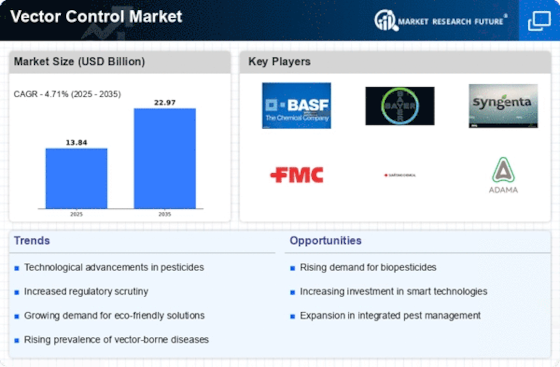Market Trends
Key Emerging Trends in the Vector Control Market
vector control market, which focuses on combating diseases spread by insects and other vectors, is experiencing notable trends driven by various factors like urbanization, climate change, and emerging infectious diseases. One significant trend is the increasing demand for vector control solutions in urban areas due to rapid urbanization. As cities expand, they create favorable environments for vectors like mosquitoes, leading to higher incidences of diseases such as malaria, dengue fever, and Zika virus. Consequently, there's a growing need for effective vector control measures in urban settings, including larvicides, insecticides, and mosquito traps, to mitigate disease transmission.
Climate change is also impacting vector control trends by altering the geographical distribution and seasonal activity patterns of vectors. Rising temperatures and changing precipitation patterns create conducive conditions for vector proliferation, expanding the range of diseases they transmit. Consequently, vector control efforts must adapt to these changing environmental conditions by implementing proactive and adaptive strategies. This includes the development of climate-resilient vector control products and the establishment of early warning systems to anticipate disease outbreaks and deploy interventions effectively.
Furthermore, the emergence of new and re-emerging infectious diseases is driving innovation and investment in the vector control market. Diseases like Zika virus, chikungunya, and West Nile virus have garnered global attention, spurring research and development efforts to develop novel vector control technologies. One example is the development of genetically modified mosquitoes that are engineered to suppress vector populations or render them incapable of transmitting diseases. These innovative approaches hold promise for controlling vector-borne diseases in a sustainable and environmentally friendly manner.
Additionally, there's a growing emphasis on integrated vector management (IVM) strategies that combine multiple interventions to target vectors at different stages of their life cycle. IVM approaches leverage a combination of chemical, biological, and environmental control methods tailored to local vector ecology and epidemiological context. This holistic approach not only enhances the effectiveness of vector control efforts but also reduces reliance on chemical insecticides, mitigating the risk of insecticide resistance and environmental harm.
Moreover, advancements in technology and data analytics are revolutionizing vector control by enabling more targeted and efficient interventions. Remote sensing, geographic information systems (GIS), and spatial modeling techniques are being utilized to map vector habitats, identify high-risk areas, and optimize resource allocation for vector control activities. Furthermore, mobile applications and digital platforms are facilitating real-time data collection, surveillance, and monitoring of vector populations, enabling rapid response to disease outbreaks and evaluation of control interventions' impact.
However, despite these positive trends, the vector control market faces challenges such as insecticide resistance, limited access to resources and expertise in resource-constrained settings, and inadequate funding for vector control programs. Addressing these challenges will require concerted efforts from governments, international organizations, research institutions, and the private sector to develop innovative and sustainable solutions, strengthen health systems, and enhance collaboration and capacity-building initiatives.
In conclusion, the vector control market is undergoing significant transformations driven by urbanization, climate change, and emerging infectious diseases. Effective vector control strategies must adapt to these evolving challenges by embracing innovative approaches, integrating multiple interventions, leveraging technology and data analytics, and promoting collaboration across sectors and stakeholders. By prioritizing investments in vector control and strengthening global partnerships, we can mitigate the burden of vector-borne diseases and protect public health, particularly in vulnerable populations.


















Leave a Comment